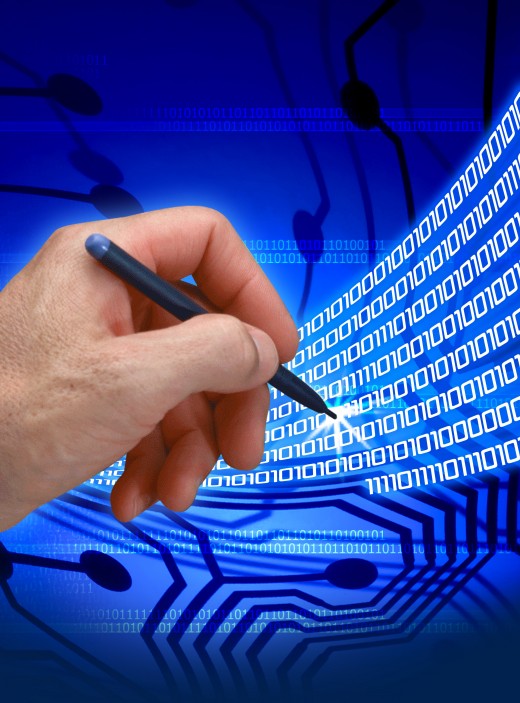Internet, Computers, and the English Language

When we think of the impact that computers and the internet have had on the use of the English language, it often brings to mind the nightmares borne of the scummy posts between bulletin-boarders in the 1980's, when a 2800 baud modem was considered hotrod, and hacking could be done with a homebuilt box of components, a couple of screwdrivers, and a payphone. It brings to mind the controversy around the effect spellcheckers have had on the thought processes that allow us to actually understand how to spell words, and makes us really question how much these modern conveniences of thought and communication have contributed to the apparent degradation of grammar and spelling in type, a medium that was previously considered the arena of professionals well versed in the intricate workings of the English language but which has since become less exclusive.
But in those pioneering days of the silicon microchip, the internet was a more tangible thing, a fiberoptic spiderweb flowing from telephone to telephone that directly connected people to one another, no matter the distance, instead of a network depending upon the service providers of today to route information through some globally accessible string of computer hardware shared by everyone. There was a sort of odd, stifling privacy in those days, but also a cave-like darkness that had yet to be explored, with individuals shuffling slowly toward one another, their words little more than luminescent green text appearing across shaky, grey-black screens, and the name of the shadowy, almost legendary monster hiding in their midst on the lips of everyone, cyber-savvy or not: "Hacker." He was the man who had all the codes, all those secret ten-digit phone numbers that would give him access to everything from the credit card accounts of the recently dead to the power bills of friends and relatives and everything in between.
Those were the days that first left us questioning the effect that computers (and later the internet) have had and will have on the common man's use and understanding of the English language, and the question hasn't really gone away. But then, consider a typical 90's sentence roaring through cyberspace with all the blunt elegance of "Sup d00dz!1! 1337 lol! I juz haxx0rd teh p0wer c0! lolz0rz!" or the more contemporary (and grammatically speaking, far more stable) equivalent: "Heyo lol i totaly just like downloded taht new harbl movie lol." With language like that (and worse) showing up in print on public domains, people start to wonder where society went wrong- is it unreasonable to expect at least a fifth grade understanding of the English language from the hordes of people with access to a computer and the internet, some of whom actually hold college degrees?
But perhaps things aren't all that bad. Let's take a look at the other side of things- consider the fact that computers are now a recognized and accepted part of education in modern day, first-world countries. We tend to overlook the fact that college requires the use of a computer for research and the creation of essays and projects, or that some universities require the students to bring laptop computers to class, but nothing is taken so much for granted as the fact that, being almost wholly text-based, computers (and the larger body of the internet) absolutely require reading skills to operate and navigate!

Beyond that, consider all that the denizens of the internet have done to promote literacy- Online writing workshops, guilds, and even reading assistance pages litter nearly every corner of the world wide web, and many famous works of literature are freely available online if you know where to look, from Mary Shelley's Frankenstien and Joseph Conrad's Heart of Darkness to the works of William Gibson or Albert Einstein and Niccolo Machiavelli. Publishing companies, from the large, universally accepted and ultimately exclusive kind to the smaller, homebrewed variety that cling to life and desperately seek out new writers to boost their notoriety work hard to saturate the web with the written word. Intelligent and intellectually deep material shows up regularly in long diatribes and short, meandering strings on hundreds of thousands of websites across the globe every day, and E-zines and E-books are everywhere, ranging from the fine and professional to the grammatically lacking and pointless sores of putrid and festering quasi-english that infest the internet like a literary plague. Online references, like the easily remembered "Dictionary.com" and its sister sites, or encyclopedias like Wikipedia make information about almost anything both easily accessible and usually presented in terms that are easy to understand without having to sacrifice much, if any, critical detail or feeling.
So where's the problem then? Well, perhaps it's in the way we're conditioned to think. Consider that perhaps one of the most frustrating things to the reading adult in our modern society is abundances of obvious flow and grammatical errors in the things we read. We're so used to everything written professionally being typed, and everything typed being professionally written, so our minds have become accustomed to this notion, and errors throw the average reader for a loop. Logically speaking, it makes sense, right? We pick up our favorite newspapers, magazines, novels and, if we're looking, we'll see probably two or three errors in every hundred pages or so (that's roughly 1 in 17000 words for market paperbacks.) But if we leaf through the myriad posts of an online blog or a discussion forum, the more reserved and "grammar-conscious" of us find ourselves balking at the frequency of minor errors that could be eliminated by a quick once-over glance at the material in question before it's sent or posted.
Perhaps this viewpoint also stems from the fact that typed text typically requires a machine to be properly done, (whether it be a typewriter or a computer,) because, in a way, machines are seen as being superior to the fleshy elegance of humanity. After all, we don't expect perfection of spelling or grammar in the mad scribbles of a physician, the love-notes we find wedged in the strangest (and yet always most familiar) places by our own special someone, or the handwritten letters we get from highschool students or children studying abroad. Not convinced? Consider any science fiction film or television show- the machine is always far more capable, advanced, and less likely to make mistakes than the actors. As a society, we've grown to accept this odd fact, we've almost been conditioned by various forms of media to believe that machines have been programmed not exactly to be perfect, but to be somewhat above the human mind in their analytical capacity. To err is human, as the saying goes, but we expect better from the clearly legible etches left on the amorphous walls of cyberspace by the millions upon millions of individuals that go tracking through its depths every day. After all, how hard is it to use a spellchecker, right?
So while the tainted waters of the internet continue to pump the usual mix of pristine, clear knowledge and raw sewage into our computers, the debate rages on amidst it all. Will computers and the internet be the grammar and spelling's saving grace, or will they ultimately prove to be the shadowy specters caught holding the axe when the written word falls before the relentless drumbeat of human progress? It all comes down to how we use the technology at our disposal, and the example we set for future generations. With great responsibility comes great power; our choices today shape the realities of tomorrow, and with a little work and perhaps a little luck, we'll see the dawn of a new age of literacy and clarity of thought, and an intellectual reawakening unlike anything the world has seen before.









